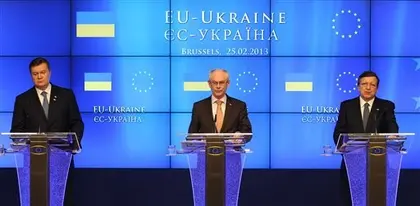“One country cannot at the same time be a member of a customs union and be in a deep common free-trade area with the European Union,” said Jose Manuel Barroso, president of the European Commission, the EU’s executive arm. “This is not possible.”
But that appeared to be what Ukrainian President Viktor Yanukovych is hoping to achieve. Ukraine, he said, is in negotiations with Russia to “find the right model” for cooperation with the customs union. And he said, as well, that Ukraine’s pro-EU course had been set by law and could not now be changed.
Russia, Kazakhstan and Belarus are members of a Customs Union that envisages closer economic integration, in a manner similar to the European Union, with free movement of goods. That would make a free-trade agreement between the EU and Ukraine in effect a free-trade agreement with those other countries as well.
The exchange came at a news conference following an EU-Ukraine summit in Brussels.
And it took place against the backdrop of demonstrations in Kiev, the Ukrainian capital, where several thousand people marched near government buildings and rallied in a central square, denouncing Yanukovych and calling for deeper integration with the European Union. While efforts to forge closer ties with the EU have broad public support in Ukraine, many are worried by what they see as Yanukovych’s rollback on democracy.
The rally marked Yanukovych’s third anniversary in office. The protesters chanted “Ukraine to Europe,” and “Free Yulia,” demanding that former Prime Minister Yulia Tymoshenko, who is serving a seven-year sentence on abuse-of-office charges, be released from jail.
One of the primary goals of the summit in Brussels was to make progress toward the signing in November of an agreement that would include the establishment of a “deep and comprehensive free trade area” between the EU and Ukraine.
But EU leaders said that wouldn’t happen unless Ukraine made progress in several areas, including what they called “selective justice,” an oblique reference to the cases against Tymoshenko and her top allies.
The West has condemned those prosecutions as politically motivated and urged Ukrainian officials to release those involved. The EU has put on hold a key cooperation deal with Kiev over her jailing. Tymoshenko says she is innocent of all charges and accuses Yanukovych of having thrown her in jail to bar her from October’s parliamentary elections and from a presidential election in 2015.
Yanukovych has said the case is not political and he is unable to interfere with the judicial process. He has said repeatedly that close relations with the European Union are his top goal and indicated that Tymoshenko’s case should be resolved soon.
But at the same time government prosecutors have made Tymoshenko a formal suspect in organizing the murder of a businessman 17 years ago and threatened her with life in prison.
EU leaders appeared to be using the carrot-and-stick approach in an effort to induce Ukraine to reform.
“There is currently an historic opportunity to make a leap in the EU-Ukraine relations” by signing the agreement with Ukraine in Vilnius, Lithuania, in November, said European Council President Herman Van Rompuy. The council is the gathering of the 27 EU heads of state and government.
But EU officials are insisting that Ukraine work toward eliminating what they call “selective justice,” reforming its election laws, and implementing economic reforms.
“I’ve underlined the European Union’s call for determined action and tangible progress in these areas — at the latest by May, this year,” Van Rompuy said. “Progress in these areas is realistic and feasible, but time is very short.”
For his part, Yanukovych said work in these areas had already been accomplished and more was on the way.
“We discussed the steps in detail that Ukraine is going to take in improving the election laws and the justice system,” he said. And he said he was committed to signing the agreement in November.
Officials also said they were working toward an easing of visa requirements between Ukraine and the EU.
At the summit, EU officials announced a €610 million ($804 million) aid package for Ukraine. Since 1991, the EU has given Ukraine more than €3 billion ($4 billion) in assistance.
You can also highlight the text and press Ctrl + Enter




